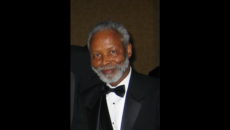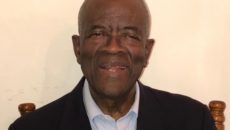In the midst of the current 2017 elections season, I have read many flippant remarks about the imminent peaceful transfer of presidential power as a first in Liberian history.
No doubt the memory of the bulk of the present “youth bulge†generation is conveniently limited to the recent past. But then I read an interview by the celebrated author Helene Cooper that went like this:
Interviewer: “Sirleaf is stepping down this year. How does it feel to see her presidency ending?â€
Cooper’s reply: “What is weird is this has never happened before – we’ve never had a post-president in Liberia, somebody who voluntarily left at the end of their term.â€
I thought it appropriate not only to attempt to correct the error but to use the opportunity as a teachable moment especially for the benefit of our youth.
Often correctly cited as the last time Liberia experienced a peaceful transfer of power is the Edwin Barclay to William V.S. Tubman transfer in January 1944. Tubman who served for 27 years died in office in July 1971 and was succeeded by his vice president, William R. Tolbert, Jr.
After some nine years in office, the deluge happened with his assassination and the bloody overthrow of Tolbert and with him the perennial True Whig Party hegemony.
While President Samuel Doe and President Charles Taylor were each ‘democratically elected,’ the 1980 political violence placed Liberia on a path of instability and war that effectively ended only with the 2005 election which brought to power President Ellen Johnson Sirleaf.
But Tubman’s excessively long tenure of 27 years may have been the spark that lit the flame of political turmoil. This point has been made well in at least two books, Tuan Wreh’s behind the scenes account, Love of Liberty: The Rule of President William V. S. Tubman in Liberia, and David Chieh Sr’s Needles, Bullets and Knives: The Assassination of Three Liberian Presidents.
The men – and they were all men – who ruled Liberia from independence in 1847 to 1944 exercised power, almost all of them with restraint and a sense of proportion. Presidents were seldom perceived as all-powerful, and as I narrate later, some felt the pressure to resign the presidency, some were defeated in their quests and most left office in accordance with constitutional dictates.
Roberts to Benson Succession
Joseph Jenkins Roberts, the first president, was elected in 1847 and inaugurated the following year. His vice president was Nathaniel Brander. The pair served a first two-year term and Brander was replaced in the second term by A. D. Williams as vice president. During his last term Roberts again changed his vice president, replacing Williams with Stephen Allen Benson. Roberts’ Republican or True Liberian Party government did not seek re-election after four two-year terms in office.
It is remarkable that the peaceful transfer of power from Roberts to Benson was marked, at the inaugural ceremonies by a “valedictory†address by outgoing President Roberts, an address that preceded President Benson’s inaugural address.
Benson to Warner Succession
Vice President Benson won the presidency in the elections of 1855 with Benjamin Yates as his vice president. In his third term in 1860 Benson dropped Vice President Yates, replacing him with Daniel B. Warner. A Whig Party had emerged but did not then threaten the ruling Republicans.
Warner to Payne Succession
The Republicans nominated Vice President Warner as president at their convention in 1862. James Priest was his vice president. Benson transferred power to Warner at the latter’s inauguration in 1864. The Warner-Priest team was re-elected in 1865 in a hotly contested election, which saw a growing strength of the Whig Party. James S. Payne defeated Warner in the election of 1867. Payne’s vice president was Joseph T. Gibson. The nomination and election of the pair incurred such political bitterness that it led to a weakening and eventual defeat of the Republican Party. The defeated Warner transferred power to Payne at the latter’s inauguration in 1868.
Payne to Roye Succession
The Republicans re-nominated Payne and Gibson in 1869. Meanwhile, the former Old Whigs had re-organized as the True Whig Party in Clay-Ashland under the leadership of John Good. Edward James Roye and James S. Smith were the presidential and vice presidential candidates for the TWP. A bitter campaign ensued in part reportedly over the question of skin tone (mullato vs. ebony black), though some have suggested that President Benson was not mullato. Former President Warner joined forces with the Whigs, having rankled over his party’s failure to give him a third term as they had done for Roberts and Benson. The True Whig Party candidates were elected in May 1869.
Though Roye and Smith were inaugurated in January 1870, some suggest the Republican bitterness over their defeat engendered what is know as the Roye Episode in Liberian history which involved two issues instigated by his Republican opponents: the loan of 1870/71, and extension of presidential tenure from two to four years. Charged with misuse of loan funds and with unconstitutional action regarding the extension of the presidential term, Roye was forcibly removed from office and assassinated. The atmosphere that prevailed in the aftermath of Roye’s overthrow was almost identical to what obtained in the aftermath of Tolbert’s overthrow 109 years later.
Roye to Smith Succession
This was not a smooth transfer of power. President Roye was violently removed from office as result of the Republican Party revolt against his regime. The Republicans established a committee to exercise executive power until the vice president could be brought to the capital from his Grand Bassa home. It took fully three months before Vice President Smith was sworn into office as president by the Legislature. As President James Smith completed Roye’s unexpired term in December 1871, the Legislature elected former President Joseph Jenkins Roberts as president by a ‘Joint Convention.’
Smith to Roberts Succession
Roberts thus came to office a second time with his induction in January 1872. A year later, he was reelected by the Republicans with Anthony W. Gardiner as his vice president. The pair was installed in office in 1874.
TWP did not even contest in aftermath of the Roye overthrow. The second overthrow suffered by the TWP came 109 years later with the overthrow of President Tolbert in 1980.
Roberts to Payne Succession
The now old and feeble Roberts apparently did not seek another term, and so the Republicans turned to former President Payne, who along with running mate Charles Harmon, won the elections of 1875. The Payne-Harmon ticket was inaugurated in January 1876. Former President Roberts died February 24, 1876.
Payne to Gardiner Succession
The Republicans re-nominated Payne for another term. The TWP having sufficiently recovered from the events of 1871 fielded Gardiner and Alfred F. Russell. Gardiner won the election and together with his vice president, was inaugurated in January 1878. Gardiner was re-elected in 1881, with no Republican contesting. After serving only a year in his second term Gardiner resigned because of the humiliating loss of the Gallinas territory to the British, coupled with his ill health, and Vice President Russell succeeded him.
Russell to Johnson Succession
Early in 1883, the TWP decided to pass over President Russell because of his association with Gardiner in loss of the western territory and nominate H. R. W. Johnson and James Thompson as candidates respectively for the presidency and the vice presidency. Curiously, the Republican Party also nominated the pair. At his inauguration in 1884, Johnson apparently had to choose a party and he opted for the TWP. This first president born on Liberian soil effectively inaugurated the beginning of TWP hegemony, which was not broken until the 1980 coup, some 96 years later.
Johnson to Cheeseman Succession
Johnson went on to serve four terms (1884 through 1892). He stepped down gracefully and Joseph J. Cheeseman was nominated to replace him with William D. Coleman as vice president. A new Republican Party nominated former Vice President Anthony D. Williams as its candidate. Cheeseman and Coleman won the election and were inaugurated in January 1892. The TWP nominated again the Cheeseman-Coleman ticket. A. D. Williams contested once again in opposition. President Cheeseman and his vice president served three terms, the last of which began in January 1896. On November 15, 1896, President Cheeseman suddenly died in office.
Cheeseman to Coleman Succession
Cheeseman’s vice president succeeded him. The TWP re-nominated President Coleman in 1899 with J. J. Ross as vice president. A new opposition party, the National Union Party, nominated A. D. Williams for the presidency. Ross was also endorsed by the NUP. The TWP ticket won. Vice President Ross died October 1899.
Coleman to Gibson Succession
President Coleman was inaugurated January 1900 with no vice president. On December 11, 1900, Coleman resigned the presidency because of his inability to contain infighting among Gola-Liberians as he attempted extension of the state’s writ. The office of the vice president being vacant, Secretary of State G. W. Gibson, then next in the constitutional line of succession, was sworn in as president.
Gibson to Arthur Barclay Succession
In the ensuing election of 1901, Gibson and running mate Joseph D. Summerville were nominated by the TWP. A new opposition party, the People’s Party, nominated former President Coleman and James H. Dennis as his vice president. The victorious Gibson was inaugurated January 1902, standing down after a single term.
Arthur Barclay to Howard Succession
In the 1902 election, Arthur Barclay and J. D. Summerville constituted the TWP ticket. There was no opposition. In the election that followed a new party, the Old Whig emerged. Former President Coleman, with John Hilary Tubman as his running mate, was the candidate of the Old Whig. The incumbent Barclay and Summerville of TWP won, and Barclay was first inaugurated January 1904. Barclay went on to serve three terms despite opposition from “The Other Whig Party†which fielded a ticket in 1905.  Vice President Summerville died in July 1905, and was succeeded by J.J. Dossen at the 1907 convention of the TWP.
At the 1907 convention, a constitutional amendment increasing the presidential term from two to four years was approved and successfully submitted to referendum. Barclay thus began his third term in January 1908, serving to January 1912. Arthur Barclay transferred power to the elected TWP candidates Daniel E. Howard, the president-elect and S.G. Harmon, his running mate. The pair was inaugurated January 1912. President Howard served two four-year terms.
Howard to King Succession
At the TWP convention in 1919, C. D. B. King and former Vice President Dossen contested. King and his running mate Samuel A. Ross won, and Howard transferred power to King on inauguration day, January 5, 1920. The People’s Party led by former President Howard in 1922 contested the election in 1923. The opposition candidates were former Vice President S. G. Harmon for president and T. J. R. Faulkner his running mate. King won, though he dropped his vice president and carried perhaps the first indigenous/Grebo-Liberian vice president, Henry Too Wesley as his running mate. The King-Too Wesley team won.
Four years later, King again contested under the banner of the TWP and won, though he dropped Vice President Too Wesley and replaced him with Allen N. Yancy, reportedly because Too Wesley was sympathetic to the opposition’s resistance to a third term. Though the opposing People’s Party led by Faulkner strenuously campaigned against a third term, invoking even then the gathering storm of the “Fernando Po forced labor crisis,†King won his third term and was inaugurated with Vice President Yancy on January 2, 1928. This was to be his last inauguration for he did not complete his term. He was forced to resign his office on March 3, 1930, his vice president having preceded him in resigning his own office a day earlier.
King to Edwin Barclay Succession
As in 1900, when Secretary of State Garretson Gibson succeeded to the presidency upon the resignation of President Coleman and with a vacant vice presidency, Secretary of State Edwin Barclay was sworn in as president. By then the forced labor crisis was raging. Barclay contested the 1931 election in his own right and won. He was inaugurated in 1932 and served his first four-year term during which the constitution was amended to provide for a single eight-year term. Amidst mounting internal opposition and external disdain Barclay won his single eight-year term, which ended when his successor, William V. S. Tubman was inaugurated in January 1944.
Edwin Barclay to Tubman Succession
And now to the succession many Liberians seemingly can recall, Edwin Barclay to Tubman. In January 1944, another peaceful transfer of power from Edwin Barclay to Tubman occurred, the latter having won the nomination of the TWP against opposition from James Francis Cooper’s Democratic Party.
Tubman served his first eight-year term and then maneuvered a constitutional amendment for an indefinite succession of four-year terms. That way, he remained as president until he died in office in July 1971, not completing his fifth term though elected to the sixth.
Presidential Successions Going Forward
Peaceful transfers of presidential power ended with Vice President Tolbert constitutionally succeeding the deceased President Tubman. Tolbert would himself be overthrown in a bloody coup d’état in April 1980 after completing his predecessor’s four-year term (1972-1975) and five years into his own eight-year term, the latter made possible through another constitutional amendment.
Following a military rule from 1980 to 1986, Samuel K. Doe was inaugurated the 21st president of Liberia. He was assassinated on September 9, 1990, two years shy of his first six-year term of office. Liberia descended into civil war, which raged on until 1997 when Charles Taylor won an election and was inaugurated president. He too was soon forced to resign and in August 2003 he went into forced exile. His vice president, Moses Blah, succeeded constitutionally but voluntarily relinquished his mandate to an interim leader, Charles Gyude Bryant, in facilitation of a peace agreement.
Bryant assured the interim until elections were held in 2005, which brought to power President Ellen Johnson Sirleaf and her running mate Vice President Joseph N. Boakai. The pair is completing its second and constitutional last term. It is this development that explains the current political campaign, which will determine who succeeds President Sirleaf and be inaugurated the 25th President of Liberia in January 2018.
This brief account of presidential power transfer points to a rarity in the transfer of power from an incumbent political party to an opposition party. The 1870 transfer of incumbent Republican Payne to opposition TWP Roye was the only clear such transfer. Less clear was the transfer from Republican Russell to H. R. W. Johnson who had the luxury of not declaring party affiliation (both parties supporting him) until after the election when he declared for the TWP. It will be of some interest to see whether the impending October 2017 elections will witness power transfer within the ruling party or from the ruling Unity Party to one of the scores of contesting opposition parties.



